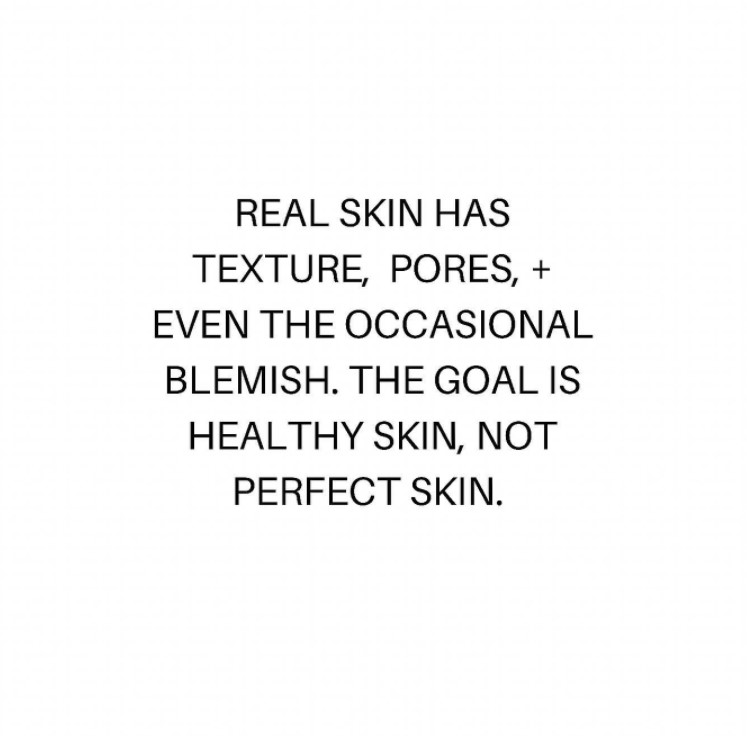For most of us, it only takes one short scrolling session on social media to be swamped with hundreds of retouched images. Before you know it, you’re re-evaluating your own skin in front of the mirror and analysing every small blemish and spot. How do other people end up with such great, seemingly-flawless skin? If that’s the loop you’ve been stuck in, here’s some news for you.
The quest for flawless skin is a fruitless one. But you don’t have to take my word for it. In this story, you’ll hear it straight from the experts.
“First of all, there is nothing like perfect skin,” explains Dr Harshna Bijlani, medical head of Mumbai-based skincare clinic The Ageless Clinic. “If you look at the skin under a magnifying glass, you will see pores that look like tiny craters, hair follicles that look like bumps, fine lines, and pigmentation based on the number of cells present there,” she adds. Her two cents on this topic: “Skin has texture and that is absolutely normal and should be represented that way,” she adds.
If skin conditions are very common, doesn’t that make them normal?

Image source: Instagram.com/AliaBhatt
The three most common conditions seen in Indian skin are pigmentation, dark circles, acne and acne scars. In fact, according to a 2015 study published in the Indian Journal of Dermatology, about 85 per cent of adolescents and young adults deal with acne in their lifetime. A 2016 study published in the same journal reported that 80 per cent of the population presents diversity in skin colour on the face due to hyperpigmentation, melasma, and dark circles.
Thinking of clear skin as your goal and even the slightest blemish as a ‘flaw’ fits perfectly into the general toxic view that has led to all of our misunderstandings our skin for decades. You’re feeding the monster–aka your thoughts–and this will eventually tear you down. “I was attending a press event when a fellow blogger told me that my acne looked ‘ugly’ in person. It made me realise that there must be so many other girls out there who get told the same thing daily. They don’t have anyone standing up for them and that pushed me to post a photo with no filters. It went viral and that is how I got my introduction in the beauty space!” says Prableen Kaur Bhomrah, a skin-positive influencer.
Change starts with not associating skin with ‘flawlessness’

Step one on your journey to accepting your skin? Alter your vocabulary. “The word ‘flawless’ is a mythical beauty construct that is responsible for shredding away our individual and collective sense of self-worth,” explains Paayal Mahajan, founder of luxury skincare brand Essential Body Couture and a face massage expert. She adds, “Historically, across cultures, women have been held up to impossibly high standards of ‘beauty’. Today it has evolved into a frenzy that consumes us and along the way, the beauty industry realised that these great insecurities can lead to profits.”
She tells us that every time she begins a new batch of her face workout classes, her heart breaks at the huge number of ‘issues’ women want to tackle. “There is a sense of exhaustion from the constant barrage of products they’re sold and the commentary they have to deal with about their lack of ‘perfection’ and a sense of defeat because of their low self-worth.”
Putting Instagram-perfect, glowing skin on a pedestal doesn’t do anyone any favours, trust me. We’re all guilty of it, myself included. As a beauty writer who deals with bouts of hormonal acne and congestion, I tend to purchase products that promise to zap acne and any and all signs of it. This is a practise that I too am trying to break out of as it has dawned on me–better late than never–that this endless aiming for perfection isn’t doing my mental health any favours.
Even though we know that everything we see on social media isn’t real, our brains are wired to see it otherwise. “It is heavily edited and Photoshopped which we know is misleading but still we end up comparing ourselves with that person,” explains Bhomrah. “When you see these ‘perfect’ people and compare their skin to yours–which may have acne, hyperpigmentation, eczema, you may feel your skin is not normal–when it actually is,” adds Dr Bijlani.
For that glow you see on every other influencer or brand’s feed, all you need is some clever lighting and a few odd filters. If you expect to see that in real life, every time you look in the mirror, you will end up being disappointed. Your skin isn’t a bulb, it doesn’t have to have a megawatt glow.
Genes play a huge role when it comes to skin

Image source: Instagram.com/SaraAliKhan05
You can do everything right like switch your diet, exercise, overhaul your skincare routine and opt for a silk pillowcase and still deal with skin conditions. “There are some people who have smaller pores, more even-toned skin, and fewer fine lines and that is because of their genes,” explains Dr Bijlani. This isn’t to say that taking care of your skin–if you have conditions that bother you–won’t make a difference. Our goal should healthy skin, not flawless.
Stop buying into false beauty ideals
“Toddlers pick up cues from their families and it gets worse when they grow up. We’re told by someone attractive that a product is the ultimate cannot-live-without-must-have and then, two days later, it is something else,” explains Mahajan. “I have heard stories from women ages 20 to 40 being gaslit and sold expensive products whilst constantly being nudged and told that they’re not enough as they are,” she adds.
Mahajan is on a mission to help women better their relationships with their skin. “Why do we allow these harmful practises to continue? Why are we so afraid to speak up when a medical professional looks us dead in the eyes and gaslights our insecurities?” With skin conditions being so common, we can’t ignore the fact that there is a serious lack of representation in the media which hyper focuses on poreless, flawless skin only. This can take a toll on your mental health especially since it pushes the belief that the rest of us aren’t doing or investing enough in our skincare routines. How can something like that not tear our mental health to pieces?
The system is flawed, you aren’t

Redefining what ‘healthy skin’ means can take time but it is never too late to get started on your journey. “I used to be a beauty junkie and when I lost 55 kilograms of weight, my collagen broke down. Suddenly I went from being the ‘fat girl’ to the ‘tired one.’ Everywhere I turned, there is misinformation and awful quick fixes. In short, everything that promised perfection. All of it leads to lack of self-confidence and wastage of money,” explains Mahajan. If you ever feel like your self-worth is tied to the way you look, take a second to question that feeling. “Is there any reason a 22-year-old girl should be worried about signs of ageing? Or that a successful businesswoman in her 50s should feel broken because she has hyperpigmentation?” she asks.
“From hirsutism and eczema to acne–I’ve had my share of skin conditions that did take a toll on my mental as well as emotional health. Studying medicine is what really helped me to understand my concerns better and so I could work on them to prevent long-term damage,” explains Dr Bijlani. If you have a skin condition that is weighing heavily on you, especially if you are in pain or it is making you self-conscious, get the right medical support. If you’re okay with the said condition and it doesn’t hurt your quality of life, not seeking treatment is okay too.
4 signs that your skin is normal, even though you don’t think so

With skincare trends like glass skin setting the bar unrealistically high for what a healthy complexion should look like, it is easy to put your skin under the microscope and feel like it isn’t looking great. “There is no standard of measurement that tells you if your skin is healthy, as everyone is unique and our genetics, lifestyle, and environments play a huge role on our skin,” explains Dr Bijlani. Having said that, here are four general pointers to keep in mind to see if your skin is healthy, even if you’re convinced otherwise.
1. It doesn’t feel tight or stretchy
“A sign of healthy skin is that it feels normal. If it feels stretched out, consult your dermat and check if your skin is excessively dry.”
2. Absence of recurring acne
“It isn’t possible that your skin never breaks out in your entire life, no matter how good you are to your skin. As long as you’re not regularly breaking out and just have a few spots every few months, you don’t need to worry.”
3. You’re wearing SPF
“Expecting everyone to have flawless skin isn’t realistic but as long as you’re being sun-smart and don’t have any drastic difference in colour on your skin or redness, you’re fine.”
4. If your skin has texture
“Yes, there will be open pores and hair follicles but they should be evenly distributed throughout and not protruding to the surface to the extent that they feel uneven or like tiny bumps.”